Copyright ©2008 PopEntertainment.com. All rights reserved.
Posted:
March 10, 2008.
No
one ever expected a special-effects laden epic conceived and crafted by
producer/director Roland Emmerich to be concerned about gaps in logic or
story structure. So it goes with the German-born impressario's latest
faux-legend, the prehistoric 10,000 BC. From his
civilization-destroying tentpole pictures like The Day After Tomorrow
and Independence Day to myth-reworking sci-fi flicks like Godzilla
and Stargate, the 52 year-old has made films that go for dramatic
effects not meaningful subtext.
Following in the grand tradition set off by 1940's One Million BC
(and continued in high camp fashion with the 1967's remake One Million
Years BC starring a fur-clad Raquel Welch), 10,000 BC follows a
young mammoth hunter's journey to secure the future of his tribe and save
the Cro-Magnon girl of his dreams from enslavement.
In this historical tale, 21 year-old Steven Strait
plays D'Leh (German for hero spelled backwards) is a near-outcast from his
tribe whose father had left to search for food to save them. It is quite the
contrast for Strait – whose previous roles included playing a rock star
wannabe in Undiscovered and a supernatural cultist in The Covenant.
When a slave-raiding party captures a large swath of his friends and the
girl he's sworn to, Evolet (Camilla Belle), he and his mentor set off to
find them and rescue his friends. Along the way he joins forces with other
tribes, bonds with a Smilodon (saber-toothed cat) and forges a slave revolt
against masters from a far more sophisticated civilizations that is building
a complex of ziggurats. Though there's not one historically accurate element
to this story, its sheer impossibility makes it a fable to be enjoyed for a
grand display of its CGI generated Mammoths and massive battle scenes.
What made you jump onboard this project?
Roland first and foremost. I am of the generation that grew up with his
films. I saw Stargate when I was nine years old. I've been a huge fan
since I was yea-high. Also I read the script and thought it was incredibly
original. Stuff of this [scale] nowadays is usually based on a comic book or
a sequel. Not that that's bad, I love those films too. But the originality
of it I liked a lot. Essentiality it's a love story that has all this action
and I just found that incredibly unique.
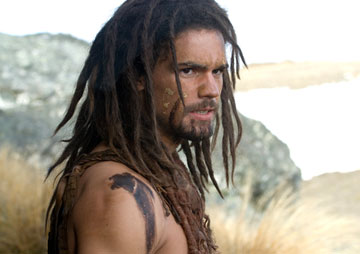 In
a way, with scenes of an Egyptian-like civilization, 10,000 BC seems
like an extension of the Stargate universe; did you talk about the
mythology that built up, as if it was the other side of Stargate from
a caveman's point of view?
In
a way, with scenes of an Egyptian-like civilization, 10,000 BC seems
like an extension of the Stargate universe; did you talk about the
mythology that built up, as if it was the other side of Stargate from
a caveman's point of view?
Sure, I think Roland has a big fascination with theories about when things
are made, lost civilizations and things of that nature. We talked about the
pyramids and the sphinx; there's a debate when they were made because of the
lack of hieroglyphics, things don't tend to match with other Egyptian
temples, but by no means is 10,000 BC a documentary. We allowed the
fantasy of it to go. We wanted to make a movie that had a little bit of
everything that you could disappear into for two hours.
Given the films that Roland has done in the past like Independence
Day, were you intimidated by him and how did he make you feel more
comfortable?
I wasn't intimidated by Roland. Even before I met Roland I had heard
wonderful things about him and I expected him to be that way and he was. Not
only is he like one of the sweetest man you'll ever met, but to me he's a
really great guy, but he's also very open. He's not locked into his own way.
We all contributed ideas. It was a communal project because everything had
to be made from scratch. There were no references for these sort of things.
Initially it was a little daunting just because of the scope of it. I had
never done anything this large before, by far, tackling the character, how
far he grows in the film was a little anxiety causing. The first day, Roland
pretty much defused that. We shot the film pretty much in sequence, from
beginning to end, which is incredibly rare. So we did get to take it step by
step. In a way that allowed us use our own experiences.
How does it feel to work on a film that's primarily CGI?
Initially silly. You're in the middle of the desert poking and prodding at
air, but once you get into the rhythm of it, you let your imagination go
because that's what you’re acting with — your imagination. And getting into
the emotion of it is fun. The first time in this film, we shot most of it on
locations so there wasn't that much blue screen. Then they just plugged in
post. They said, you react and then we'll work off of you and it was
liberating in a very strange way.
Were all of your inhibitions gone after doing the CGI stuff? Is there
anything that would embarrass you at this point?
No! You have to get over that initial phrase like you're in very little
clothes, it's freezing outside and you're poking and screaming and yelling.
You have to have a sense of humor about it initially and just have fun with
it. You have to take it in perspective. How many times in your life are you
going to be on top of a mountain, yelling and doing a shot like this? You
just have to enjoy it.
When you finally saw the finished film were you amazed at seeing the
creatures? How did you feel?
It was wild. I only saw it a few weeks ago and it's really strange seeing it
come to fruition because we started so long ago. In '05 we started prepping
this film and we shot for six months, then there was a year of
post-production. Somewhere along the line it becomes this other thing, this
nebulous cloud of experiences that never solidify until months ago. Seeing
the mammoths, saber-tooth tiger, and the smallest detail like water coming
off the tiger's fur; the smallest things was unbelievable. I was so excited.
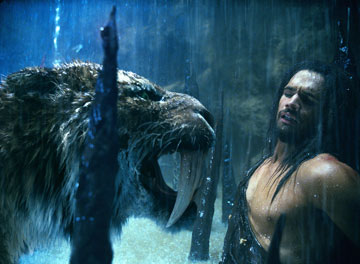 What
training did you do? You've modeled before, but knowing you're going to be
in a loin cloth for the whole movie, did that require extra time at the gym?
What
training did you do? You've modeled before, but knowing you're going to be
in a loin cloth for the whole movie, did that require extra time at the gym?
You haven't lived until you've lived in a loin cloth, but it's incredibly
freeing [laughs]. You know it's interesting, because I grew up doing
martial arts. My mom was a karate teacher when I was growing up and I boxed
to so dropping and gaining weight was something I was pretty familiar with
to get into a weight class. You drop 10 to 15 pounds to get into a weight
class and then you put it back on before the match, dirty tricks. So what we
wanted to do was I had lost 30 to 40 pounds for the project, before boot
camp, because I had done a project prior where I had to put on weight [The
Covenant] and had to lose all of it. They had me on this dietary program
that was limited enough that it would get the maximum amount off, but that
wasn't completely detrimental to my health. It was like eating rice and
celery and just running, run, and run. Then I did the boot camp to bring
everybody together. To be honest, some of the shooting we did in the film
was way harder than any prep work we had done. That mammoth sequence in the
film, I don't know whether it's five or 10 minutes actually took us weeks to
shot and we were really running through that rotunda up there and it was
really freezing. In many ways the filming was much harder than any prep work
we had done for it.
In living your character, were you disappointed that you didn't have your
grand love scene with Evolet?
Are you talking about watching things...?
Well, we never got to share in your connecting with her...
Is that just voyeurism? There are no judgments. That's okay.
Considering an alternative option, would you ever have loved to…?
I think one of the cool things we had to do in the film was that we had
establish that love at first sight really well in the beginning because we
weren't too much together in this film. In many regards we're shooting two
kinds of film, we shot in the beginning and then the end. It's a romantic
story, it's mythical romanticism. The journey of getting to each other is
more powerful than any intimacy we could have had. And you also don't want
to isolate younger audiences that I think will enjoy it. It all panned out
the way it should have. I think the core of the film is: what would you do
for love? Two people come together like I said before. There are pieces of
the film that everyone can relate to on a certain level. It grabs them and
pulls them through this ride. Roland is apt at making a different world come
alive that you can lose yourself in. Just to go and have a good time. That's
what I think it is.
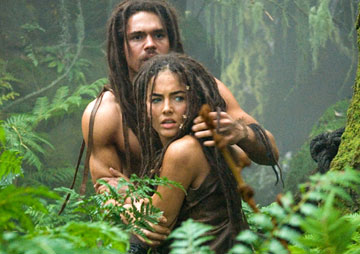 Are
you a romantic? What would you do for love?
Are
you a romantic? What would you do for love?
I hope so. For example, I had just met my wife [actress Lynn Collins of
Bug and The Number 23] before I started making this movie, we had
just moved in together for about two months than I had to go. It was like,
Okay, honey I see you in seven months. She and I were taking 26-hour flights
each way just to see each other for a weekend from Namibia. You do what you
can. For me, as a person, it's everything good about everything human and
what drives it. In that regard people have asked me before, "Do you really
believe this love story could possibly happen?" Yes, I do. I'm certainly a
believer and I've experienced it myself and know it to be true.
What was it like playing this character?
It was really cool. It was fantastic in the truest sense of the word.
Although it's a fantasy, the characters were very human. It relates this
really awkward boy that no one likes and the growth in him throughout the
film was incredibly organic because for me as a person going into this
project it was a journey of and in itself. As much as the character in the
film, there was a lot of mirroring going on. I was able to take what I was
learning myself at the time, from beginning to end, and using it. Just using
what I was feeling at the time. If anything it was really nice to have
something that was so organic.
So you're letting your hair grow out now?
Yeah, it's pure laziness.
So we can assume that wasn't your real hair in the movie?
No, that wasn't my real hair. Six months [of long hair] was enough.
How much of it was yours? Did you let it grow out?
You need to let a little bit so it attaches, because when you're running
around you don't want to the wig to do flying. It was pretty extensive. It
was about two-three hours of hair and makeup every morning. Yeah, the wig
and four different layers of makeup and mud and putting on the clothes took
an hour or so. Pretty extensive.
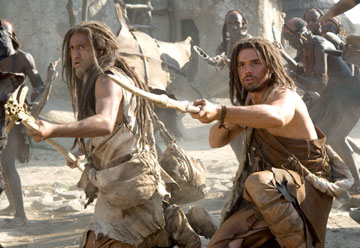 Did
you feel dirty?
Did
you feel dirty?
We were dirty. We were ruining towels across three countries by the end of
the day. You got in the bathtub and saw all the dirty coming out. I never
knew how much I appreciated bathing.
Did you do any research on slave rebellion?
You know the interesting part about what we were prepping for this whole
thing was, the core was, what would you do for love? Or coming together for
that common cause. The rebellion came about by default because of what was
happening to each individual or their family members being taken away. We
didn't do much research into slave rebellion as much as watching people come
together and a specific thing was executed that way. One of the great things
about me playing D'Leh as an actor was the huge arch from this really
awkward boy to leader of this army and it happens by default. It's nothing
he really plans on doing. I certainly never looked at heroism or a leader as
a placing point for the character development. So it just happens the way it
should. It goes with the myth or destiny of what the film's about. There's a
certain amount of research, but not to the point where we wanted to start of
isolate people or prevent them from enjoying the movie.
Was it easier playing the character knowing that there wasn't a specific
historical reference?
Yes and no, we never went into the project making a biological portrait of
someone that say sold car insurance, but I think of the character, the
growth of the character was the most challenging. Yeah, there was a lot of
leeway. We weren't making a historical movie. We used certain things like
the dialogue which were simplified to make it seem old and distinct.
Are you a fan of dinosaurs and prehistoric creatures?
Who isn't? Of course, who isn't? The idea of these huge, mythic creatures
roaming the earth at a different time and space. You go to the Natural
Museum and see these huge creatures, it's fantastic. Who isn't interested in
that?
What souvenirs did you take away from the movie?
It's a secret. I'm wearing it right now. Oh souvenirs. I was just kidding.
There weren't any from the set, but we were in New Zealand, we actually had
a ceremony before we started shooting to bless our production for good luck
and health and what not and I got a jade pendant that was given me down
there. And in Namibia, you see all these crystals in stores, they just lay
all over the place and kids sell them on the side of the road. They go and
search for them, pick them up, and sell them on the side of the road and
they make little jewelry out of them. I still have a few of those. Namibia
is actually the oldest desert on the earth and the sand has crystallized, so
they are kinds of just scattered all over.
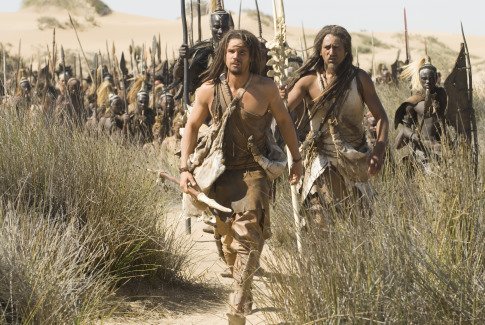 You went to all these locations. Which was your favorite?
You went to all these locations. Which was your favorite?
They were all amazing. You know New Zealand was in the dead of winter so it
was pretty cold. The mountains and whatnot were pretty amazing because of
some of the shots they were getting. It was like; nobody is going to believe
they are real. You know a lot of the locations where we were shooting I
can't believe they'd be that much different than they were in BC. There were
no roads, no civilization at some of the places we were for hundreds of
miles. Like spring bucks going back, and snakes under the tents – these
little South African kids grabbing these poisonous snakes. I have to say,
for me, Namibia at the end of the film because they had built these enormous
sets with thousands of extras. As you were flying in you could see them 30
miles away like a ramp that went up six, seven stories high, and because we
did shot it in sequence, the experience as actors and people, taking it from
this adventures what it was coming to an end was probably the most memorable
part.
Would you go back to go on a safari?
I need to go, yeah. I didn't have too many days off. I went back to New
Zealand about three weeks ago, I went to visit my wife, Lynn, she's shooting
there. It's hilarious; it's in the same town.
What is she doing?
Wolverine [directed by Gavin Hood].
How did you feel when the film shot was over? Did you take a long sleep
and vacation?
Yes, yes. I landed in Los Angeles and basically jumped in my car and drove
up north for a month and chilled out and tried to digest everything. I'd
basically gone from Namibia finishing the last day of shooting, got on a
plane and coming in. I was waiting in line at Starbucks to get a cup of
coffee and I realized, yesterday I was on a dune in Namibia with a bunch of
guys and there was a pyramid. It's a little shell-shocking. People are
looking at you like a crazy person. Yeah, I took considerable time off.
When you are out there in these far away locations, what is there to do
in your down time?
Not much, but that wasn't that big an issue. Sleeping was the main activity
in the down time.
How was the food considering you were often in remote areas?
They didn't have eating much anyway to lose all that weight. I am so sick of
chicken breast and broccoli. It wasn't all that much diversification in the
menu.
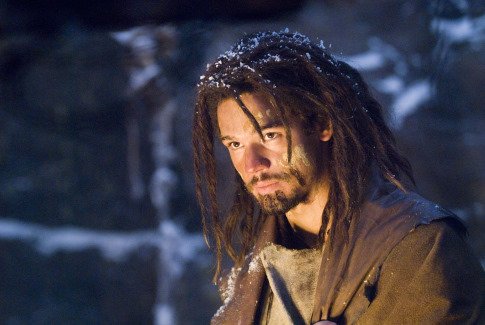 Did you get to go out and experience the cuisines?
Did you get to go out and experience the cuisines?
We got to experience the cultures but the dietary choices were really
strict. It's one of those things where if you don't have it at all it's a
lot easier than if you have it sometimes. But as far as experiencing the
culture, we were well into it.
What was the biggest lesson you learned from doing this?
Lesson? No, they're plenty. Just because of the sheer amount of experiences.
You're working with thousands of people across the whole world. And I have
to say the lesson of the film were the same. There were people from
everywhere on this film, you name it — the US, Canada, Switzerland, South
Africa, Australia, Russia, all over the place and we're all trying to pull
this thing together. It was not easy. It was a difficult shoot at times,
because of something as simple as the weather.
You're still so young. Have you been surprised by the diversity of your
career?
I've just been lucky, man. To be perfectly honest, it just panned out that
way. I started to go to acting school here when I was thirteen years old. I
really love all types of film and all types of genres so I've been fortunate
that way. I've been fortunate in many ways but that's definitely an aspect
of it, being able to do a comedy, a musical, a supernatural epic, and
recently a war drama, going across the board. If I could hope for anything
in the future, my own career, I just hope it remains that way.
Is there a grand plan?
My brain is way too small for something that large. I go where it takes me.
You got to look at it in perspective. It's a dream. Take it day-by-day and I
just have to be gracious for what I have in the moment.
Would you move back to New York?
I live in New York [and LA].
In the indie film Undiscovered you played a rocker; did you
actually sing?
Yes, that was me. I did the soundtrack.
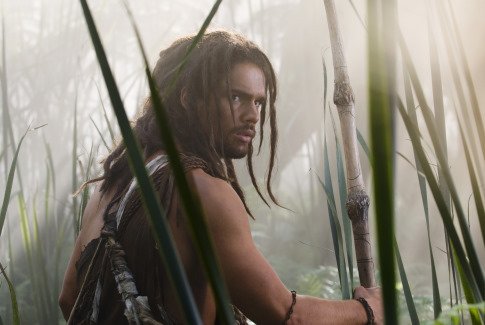 Are you going to pursuing a singing career?
Are you going to pursuing a singing career?
Not at the moment. It's hard to have band practice when you're in Namibia.
It's something I love doing and I grew up in the Village. There are always a
lot of artists around and it was a big influence on me. I did it in my free
time. Ironically, in the casting of this film, Roland had seen
Undiscovered. He was like the one guy that saw it. It was cool. From
that film, I would love to do music, so it was a great opportunity for me.
Are you friends with your co-star Ashlee Simpson?
To be honest, even during the filming of Undiscovered, I didn't get
to work with her that much. She had a smaller part and most of the stuff she
was doing was with Pell [James] When I did get to meet her she was very
nice. I haven't kept in contact with her, I'm sure she's doing fine.
What were your musical influences having grown up in the Village?
Obviously, Bob Dylan is the big folk hero. I listened to him quite a bit,
plus everything from the Stones to Beethoven and Tupac. I like all of it for
different reasons.
And now you've got Stop Loss coming out soon?
Stop Loss is obviously a very different film that was directed and
written by Kimberly Peirce [Boys Don't Cry]. It's basically about a
law suit, soldiers coming back from Iraq and getting sent back time and time
again and a lawsuit ensues because it's illegal to do that, a loophole in
the contract. So it's obviously very, very different – very socially
relevant at the moment. It's a much smaller part and I had a great time
doing it.
Is there anything else coming up?
No, I've been focusing on this right now. I have a few things that have been
presented to me. I'm just trying to take the time to make the right decision
and do justice to the blessings I've been given. I'm in no rush; I'm only
21.
Can you see yourself behind the camera?
Oh sure, absolutely. I just love film. Watching Roland was the first time I
got interested in that because I was just dumbfounded how he was able to
manage so many different parts of this production – the crew, thousands of
extras, cast, mountain that has no roads, the blizzard with four feet of
snow, but always with a smile on his face while he managed to keep the set
intimate for the actors. I want to be able to do that.
Email
us Let us
know what you
think.
Features
Return to the features page.